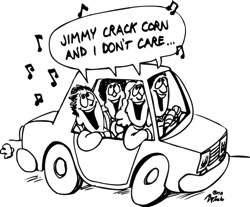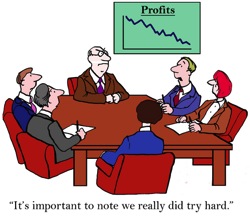Caring
 The Grasshopper disguised himself as the “Care Bear“ and delivered this: “No one can make you care but there is a price to pay for not caring.”
The Grasshopper disguised himself as the “Care Bear“ and delivered this: “No one can make you care but there is a price to pay for not caring.”
Caring presupposes that you include others; not caring keeps others out of your life.
If there is only room in your life for you, you don’t care.
Caring is giving of yourself, not just your resources.
Bending the Hallmark slogan a bit, “When you care enough to give the very best,” you give yourself.
The longer the list of things you don’t care about, the less inclusive your life will be. When that list is made up of mainly people, the less people you will have in your life.
From my vantage point, not caring is often a protection mechanism – protection from being hurt. The underlying pattern is this: If I keep it at arm’s length, it can’t hurt me.
Are you keeping life at arm’s length?
There’s not a list of things you must do that gets you to caring. For example, don’t volunteer at the retirement home if you don’t feel it because your lack of caring will be transparent.
It’s best to notice how much you don’t care and discover that it’s the wall between you and the world. Once you discover the correlation, then you can get curious about what you can care about. You don’t have to include everything, but beginning to care about one thing is a start.
You can go a lifetime justifying what you don’t care about. That exercise will produce a long list that someone can read at your funeral that few will care to attend.
All the best,
John
Be Sociable, Share!

 Did you ever notice that the conversations in your head go nowhere? The same argument that you had yesterday, last week, last year, last millennium or beyond is still going strong, and still going nowhere.
Did you ever notice that the conversations in your head go nowhere? The same argument that you had yesterday, last week, last year, last millennium or beyond is still going strong, and still going nowhere. The Grasshopper donned his fireman’s helmet early this morning and had this to say: “In an emergency, it’s more advantageous to focus on what you can do vs. what you can’t do.”
The Grasshopper donned his fireman’s helmet early this morning and had this to say: “In an emergency, it’s more advantageous to focus on what you can do vs. what you can’t do.” The Grasshopper offered a small morsel that’s a mouthful: “The biggest impediment to change is the mindset of ‘I don’t have to change.'”
The Grasshopper offered a small morsel that’s a mouthful: “The biggest impediment to change is the mindset of ‘I don’t have to change.'” “Dependability isn’t a judgement; it’s arithmetic,” so said The Grasshopper.
“Dependability isn’t a judgement; it’s arithmetic,” so said The Grasshopper. The Grasshopper offered a perspective on compromise: “Real compromise is seeing how far we can walk together without violating our principles.”
The Grasshopper offered a perspective on compromise: “Real compromise is seeing how far we can walk together without violating our principles.” The Grasshopper was whistling a happy tune the other day when he said, “Be happy when happy is here.”
The Grasshopper was whistling a happy tune the other day when he said, “Be happy when happy is here.” The Grasshopper gave me this conundrum: “A truth lies inside a lie and a lie lies inside a truth.” What does that mean?
The Grasshopper gave me this conundrum: “A truth lies inside a lie and a lie lies inside a truth.” What does that mean? Who hasn’t experienced humdrum? It’s a state of mind that keeps us humming the same tune. Is there a cure? Yes, I’m happy to report that there is.
Who hasn’t experienced humdrum? It’s a state of mind that keeps us humming the same tune. Is there a cure? Yes, I’m happy to report that there is. Like everyone, I have my hot buttons. I don’t get hooked by them as much as I used to but I still have my moments.
Like everyone, I have my hot buttons. I don’t get hooked by them as much as I used to but I still have my moments.